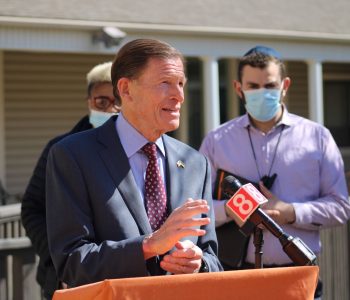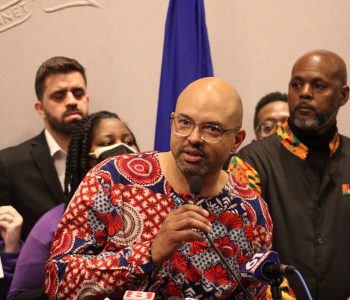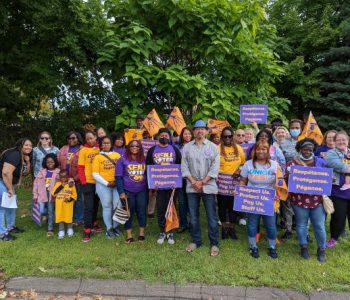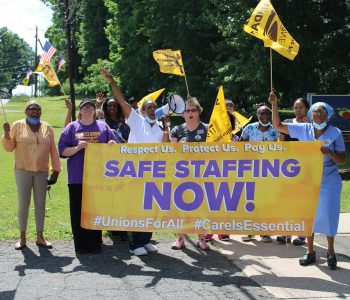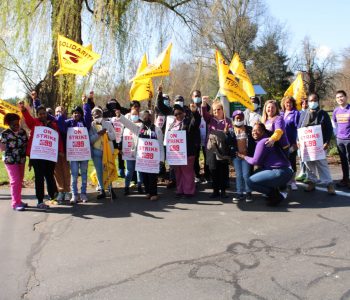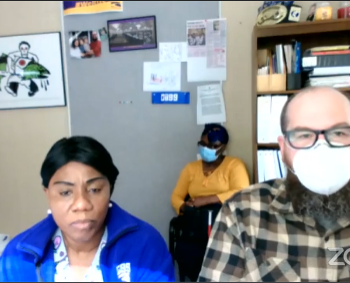One night in April, after coming off her shift at a Farmington nursing home, Chasity Williams started to feel sick.
Her stomach hurt. She had trouble breathing. Her appetite vanished. In the days that followed, she began to vomit and developed cold sweats.
“I would wake up and feel like I was dying,” said Williams, a licensed practical nurse at Touchpoints at Farmington. “It was a lot of praying, begging God to save me. I didn’t want to hurt anymore, and I wanted to be here for my kids.”
She is one of thousands of Connecticut nursing home workers who have tested positive for COVID-19 during the pandemic.
Data gathered by the Centers for Medicare & Medicaid Services offer the fullest picture yet of coronavirus cases among those employees. The data show at least 3,400 staff members have contracted COVID-19 or were presumed to have the disease, and at least 14 have died.
Until recently, the state had only estimates for the number of nursing home workers infected by the virus.
CMS data show that 2,234 Connecticut employees have tested positive and another 1,166 were presumed to have the virus. Some nursing home leaders have expressed concern about possible overlap between the two categories as more workers suspected to be sick test positive, but the data are self-reported by the facilities on a weekly basis.
Advocates, on the other hand, say the numbers are likely much higher, since the federal data are weeks behind and many employees who quarantined but did not get a test may not have been counted.
“In many cases if people start to feel sick, they stay home and they may not get a test,” said Rob Baril, president of New England Health Care Employees, District 1199 SEIU. “Early on, the availability of testing was so limited that if people developed a fever or had a cough … they would just self-quarantine. We had facilities where, at certain points, 40% of the workforce was self-quarantined.”
Baril said his union had been notified of more than 2,000 worker illnesses by mid-June, and has recorded 10 deaths among its members who work in nursing homes. The union represents about 6,000 of Connecticut’s 31,538 nursing home employees.
“In a certain sense, language doesn’t capture it,” Baril said of the pandemic’s toll on the workers. “In addition to the physical strain, in addition to the grief that people are experiencing watching their residents die and watching their co-workers die, there’s the trauma of knowing that people in some cases have brought the virus home to their family.”
‘Enormously sad and tragic’
Fourteen worker deaths have been reported to CMS since March. Riverside Health & Rehabilitation Center in East Hartford recorded two employee fatalities, as did New London Sub-Acute & Nursing.
Ten other nursing homes reported one staff death each: Chelsea Place Care Center in Hartford; St. Camillus Center in Stamford; Middlesex Health Care Center in Middletown; Touchpoints at Bloomfield; Bethel Health Care Center; Greenwich Woods Rehabilitation; RegalCare at West Haven; Apple Rehab Cromwell; Trinity Hill Care Center in Hartford; and Apple Rehab Watertown.
But interviews with leaders at several of the state’s large nursing home companies reveal there were at least four more deaths – one each at Abbott Terrace Health Center in Waterbury, 60 West in Rocky Hill, Meriden Center in Meriden, and The Willows in Woodbridge. It was not clear why those fatalities were absent from the CMS report.

YEHYUN KIM :: CT MIRROR
“I’m petrified,” Williams said about her life after recovery. She gets anxious about any new symptoms she notices.
Most of the workers’ names were not released. Nursing home leaders said the families have asked for privacy.
“These staff members were on the front lines of the pandemic. Their deaths are enormously sad and tragic,” said David Skoczulek, vice president of development for the iCare Health Network, which owns 11 nursing homes in and around Hartford.“These are folks who worked tirelessly and put themselves in harm’s way to care for the most vulnerable residents and our hearts break for their families and loved ones.”
iCare reported four worker deaths across four of its facilities – Touchpoints at Bloomfield, 60 West, Trinity Hill, and Chelsea Place. Two of the employees were certified nursing assistants, one was a licensed practical nurse and one was a bookkeeper.
iCare identified the bookkeeper as Cassondra Diaz. She worked at Chelsea Place.
“She was an extremely kind person,” Judy Konow-Hinds, an administrator at Chelsea Place. “She was always smiling and happy and willing to help in any way she could. We were extremely sad to hear about her passing.”
Athena Health Care Systems, which operates 24 nursing homes across the state, issued a statement on the death of Ilkah Hernandez, a nursing supervisor at Abbott Terrace, calling her a “hero.”
“She was devoted not only to caring for her patients but lifting up their spirits – and she made a difference in so many people’s lives,” said Timothy Brown, a spokesman for Athena. “That feeling was mutual, as she was admired and loved by her residents and her co-workers alike.”
Genesis HealthCare owns 18 homes in Connecticut and reported three staff fatalities across three buildings: St. Camillus, Meriden Center and The Willows.
“Our thoughts and prayers go out to their families during this difficult time,” said Lori Mayer, a spokeswoman for the company.
Matthew Barrett, president and CEO of the Connecticut Association of Health Care Facilities, said the early, undetected spread of the virus by asymptomatic carriers fueled the tragedy in nursing homes. In Connecticut, deaths among nursing home residents represent 64 percent of the state’s overall fatalities from COVID-19. At least 10 percent of all employees have contracted the virus or were presumed to be sick.
“It’s one of the many tragedies related to a very significant misunderstanding of how the virus was transmitting not just in nursing homes, but across the general population,” Barrett said.
Painful experiences
For many workers, catching the coronavirus was terrifying and debilitating.
One employee believes she passed it to her mother, who died. Another fears she gave the disease to her late husband.
Nursing home staff have reported missed paychecks, failed bids for workers’ compensation, painful separation from loved ones and symptoms like nothing they’ve ever felt before.
For Williams, the Touchpoints at Farmington nurse, the worst part was being cut off from her family. She was out of work and isolated for a month and a half.
During that time, she was unable to see her four boys, aged 12, 11, 10 and 6. And she could not care for her 84-year-old grandfather, who had come to rely on her.
“As far as my family goes, I’m the one that makes all of the decisions,” she said. “Once I started pushing myself away from them, the appointments stopped for my grandfather. My kids ended up struggling with online school because I wasn’t able to do that with them.
“It caused a major ripple effect.”
Gloribel Rodriguez, a dietary aide at The Reservoir nursing home in West Hartford, called out sick one day in May. She tested positive for COVID-19 shortly after.
Rodriguez asked her mother to care for her 10-month-old boy while she recovered. But her two weeks out of work weren’t easy.
“It literally felt like my body was shutting down,” she said. “It would be hard to breathe or I would be completely congested. It was hard to talk; my throat hurt a lot. I didn’t even want to get up out of bed.”

CLOE POISSON :: CTMIRROR.ORG
Lisandra Marshall-McIntosh, food service director at Kimberly Hall North, waves to supporters.
Rodriguez took extra precautions to ensure she wouldn’t spread the virus to her family. She bought paper plates and plastic silverware so she wouldn’t share dishes. She washed her clothes incessantly.
She’s still nervous about going to work. Even as the spread of COVID-19 has slowed in nursing homes, jobs on the front lines remain risky.
“It’s scary,” Rodriguez said. “I have my young son and my dad and my mom to come home to, and they’re all at high risk. I really wanted to quit.”
Valmarie Smith was working on the coronavirus unit at the Westside Care Center in Manchester when she noticed she wasn’t feeling well. Smith, a certified nursing assistant, developed “nagging little headaches” and pain behind her left eye. After work one night in May, she felt a “squeezing” sensation in her lower back and became lightheaded.
She called out sick and went for a coronavirus test, which was positive. During the three weeks she stayed home, Smith lost her appetite and sense of smell. Her fever spiked and her body ached.
“The shortness of breath was the worst part,” she said. “As the day went on, it got worse. You couldn’t pull a deep breath.”
The isolation turned to loneliness. For weeks, Smith was unable to see her two grown children, with whom she is close.
“They had to stop coming over,” she said. “It’s a very lonely thing.”

CLOE POISSON :: CTMIRROR.ORG
A health care worker holds a sign demanding more personal protective equipment during a rally in Hartford.
Open investigation
To help curb the spread of COVID-19 in nursing homes, the state is requiring all residents and staff to be tested. Testing on residents has been completed (and in some places, repeated), but staff testing is ongoing.
Ensuring there are adequate supplies of personal protective gear such as masks, gloves and gowns remains a top priority. Many employees have reported difficulty in obtaining that crucial equipment during the pandemic.
“These are workers making $13, $14, $15 an hour,” Baril, the union president, said. “They understand there is some risk that they are going to be exposed, but they did not sign up to be sacrificial lambs. They did not sign up to be treated as expendable.”
Gov. Ned Lamont has ordered an investigation of the nursing home industry and the state’s response to the crisis in those facilities. The state will hire a third-party firm to review the availability of testing materials and protective equipment, staffing challenges, communication and coordination, data reporting, and the ability to respond to outbreaks, among other issues.
The firm’s work must conclude by the end of the summer to prepare for a possible second wave of COVID-19 in the fall.
Baril said that staff members – who at times were forced to don trash bags when protective gear was unavailable – have not been taken seriously by state health officials. He is hoping the nursing home investigation will affirm the problems they have long been talking about.
“We know that the worker voice has not been seen as a credible source of information,” he said. “We certainly applaud an investigation. It’s potentially a first step, and we’ll see how it plays out.”
